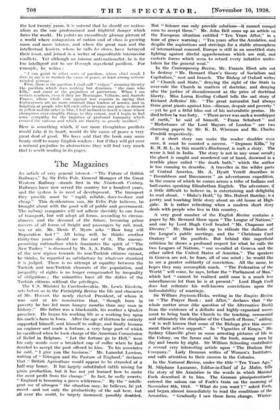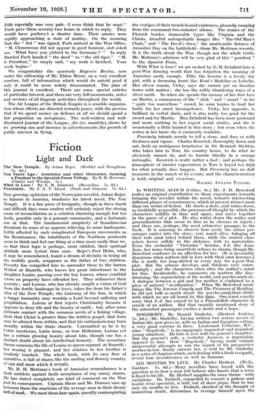The Magazines
AN article of very general interest--" The Future of British Railways," by Sir Felix Pole, General Manager of the Great Western Railway—stands first in the Nineteenth Century. Railways have now served the country for a hundred years, and the system is in need of development. The transport they provide must be "rapid, reliable, doOr-to-door and Cheap."- This desideratum can, Sir Felix Pole .believes, be brought about with the good will of public and government. The railway companies will not adhere slavishly to one form of transport, but will adopt all forms, according to circum- stances, and the demand of the future, becoming prime movers of all forms of freight and passengers by rail, road, sea or air. Mr. Denis P.. Myers asks "How long will Reparation last ? " All being well, he thinks another thirty-two years should see the end of it. The uncom- promising nationalism which dominates the spirit of "The New Turkey" is discussed by Mr. A. A. Pallis. The attitude of the new regime towards its non-Turkish citizens cannot, he thinks, be regarded as satisfactory by whatever standard it is judged. There is no attempt at equality between the Turkish and non-Turkish elements of the population, and inequality of rights is no longer compensated by inequality of obligations ; the minorities have all the duties of the Turkish citizens ,without the privileges.
The U.S. Minister to Czechoslovakia, Mr. Lewis Einstein, sets before us in the _Fortnightly Review the life and -character of Mr. Hoover, the newly elected President, of whom it was said at his nomination that, "though born in poverty he has fed more hungry mouths than any man in. history." His father was a blacksmith, his mother a Quaker preacher. He began his working life as a working boy upon his uncle's farm in Iowa. After the age of thirteen he entirely supported- himself, sent himself to college, and finally became an engineer and made a fortune, a very large part of which he sacrificed when he took charge of the American Commission of Relief in Belgium. "Let the fortune go to Hell,"- were his only words over a breakfast cup of coffee when he had decided to accept the post offered. to him. To his associates he said, "I give you the business." Mr. Lancelot Lawton; Writing of "Nitrogen and the Pasture of England," declares that "British Agriculture would appear to be stranded at a half-way house. It has largely substituted cattle raising for grain production, but it has not yet learned how to make the most profit from the change." In fact, he sadly asserts; "England is becoming a green wilderness." By the "intelli- gent use of nitrogen" the situation may, he believes, be yet saved—and not only the productivity of the soil here, but • all over the world, be largely increased, -possibly doubled:
But "Science can only provide solutions—it cannot compel men to accept them." Mr. John Bell sums up an article on the European situation entitled "Ten Years After," in a tone of grave warning ; "Ten years after the Armistice, and despite the aspirations and strivings for a stable atmosphere of international concord, Europe is still in an unsettled state- fighting against direful apprehensions which are real, and esoteric forces which seem to retard every initative under- taken for the general weal."
In the Contemporary Review, Mr. Francis Hirst sets out to destroy "Mr. Bernard Shaw's theory of Socialism and Capitalism," root and branch. The Bishop of Oxford writes of "Church and State," denying the right of the State to over-rule the Church in matters of doctrine, and denying also the justice of disendowment as the price of doctrinal liberty. Miss Lorna Keeling Collard tells the sad story of Richard Jefferies' life. "The great naturalist had always three great giants against him—disease, despair and poverty" —yet he got a fitful bliss out of his naturalistic genius. He died before be was forty. "There never was such a worshipper of earth," he said of himself. "Franz Schubert" and "Misfortunes of the Lord Mayors of London" are two charming papers by Mr. K. D. Wiseman and Mr. Charles Pendrill respectively.
If a short story can make the reader shudder even
once, it must be counted a success. " Degnam Kiln," by K. M. M. L., in this month's Blackwood, is such a story. The scene is laid in India. The story is not in any sense occult; the ghost is caught and murdered out of hand, drowned in a terrible place called "the death bath," which the author is too cunning to describe. A traveller in the wilder parts of Central America, Mr. A. Hyatt Verrill describes in " Boorabbees and Buccaneers" an adventurous expedition, in the course of which he comes across a tribe of Indians and half-castes speaking Elizabethan English. The adventure, if a little difficult to believe in, is entertaining and delightful to read about. "Blake's Hold," by Mrs. Hubert Barclay, is a pretty and touching little story about an old house at High- gate. It is rather refreshing when a modern short story deals with people who live in this country.
A very good number of the English Review contains a paper by Mr. Bernard Shaw upon "The League of Nations," and one by Lord Hugh Cecil headed "Mr. Chapman and Divorce." Mr. Shaw holds up to ridicule the dullness of the League's public meetings, and the "Christmas Card Oratory" of the pacifists. But behind this _superficial criticism he shows a profound respect for what he calls the two Leagues of Nations, "one so-called at Geneva and the other called the United States of America." The speakers in Geneva are not, he fears, all of one mind ; he would like to see a greater solidarity of conviction. All the same, he hopes they may accomplish much. "The Federation of the World" will come, he says, before the "Parliament of Man," which last "cannot be realized until man is a much less miscellaneous lot than he is at present." Lord Hugh Cecil does but reiterate his well-known convictions upon the indissolubility of marriage.
Sir William Joynson-Hicks, writing in the Empire Reviea on "The Prayer Book : and After," declares that "the whole matter arose (the question of the Alternative Book) from the existence of a definite and highly-organized move- ment to bring back the Church to the teaching, ceremonial and ultimately the discipline of the Church of Rome," adding, "it is well known that some of the Bishops give this move- ment their active support." In "Vignettes of Kenya," Mr. Sydney Glanville gives us some arresting pictures of life in the Colony, on the farms and in the bush, among men by day and beasts by night. Sir William Schooling contributes a second very interesting article upon "The Hudson Bay Company." Lady Denman writes of' Women's Institutes, and calls attention to their success in the Colonies.
In the National Review, under the title "Ten Years Ago," M. Stephane Lauzanne, Editor-in-Chief of Le Malin, tells
the story of the Armistice in the words in which Marshal Foch described it to him. The German plenipotentiaries entered the saloon car of Foch's train on the morning of November 8th, 1918. "What do you want 1" asked Foch, and. began_almost immediately to read the conditions 9f the Armistice. Gradually I saw those faces change. Winter- _ . . .
feldt especially was very pale—_I even think that he wept." Foch gave them seventy-two hours in which to reply. They would have preferrei a shorter time. Their armies were rapidly approaching a- state of mutiny. On the morning that the " Act " was signed, Foch arrived at the War Office. "M. Clemenceau did not appear in good humour, and asked me, What have you yielded to the Germans ? ' " In reply Marshal Foch handed "the deed" to "the old tiger." "M. le President," he simply said, "my work is finished. Your work begins."
We congratulate the quarterly Eugenics Review, now under the editorship of Mr. Eldon Moore, on a very excellent number, full of information which would do untold good if only it could be more widely disseminated. The plan of this journal is excellent. There are some special articles of particular interest, and there are very full memoranda, notes and reviews of all Eugenic activities throughout the world.
The Air League of the British Empire is a sensible organiza- tion whose efforts are directed towards peace, with the proviso that if we spend money on defence at all we should spend a fair proportion on aeroplanes. The well-written and well- illustrated journal of the League, Air (is. monthly), shows by its growing size and increase in advertisements the growth of public interest in flying.













































 Previous page
Previous page